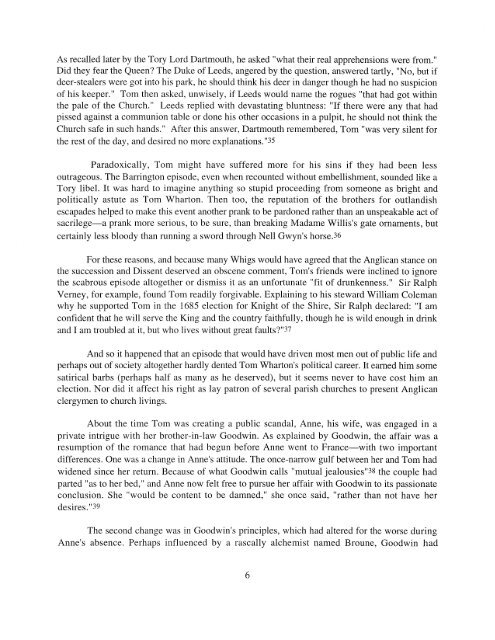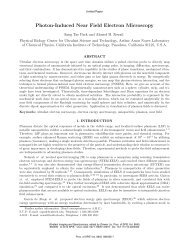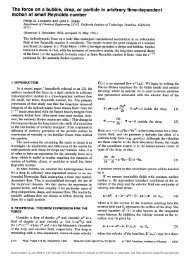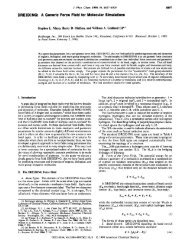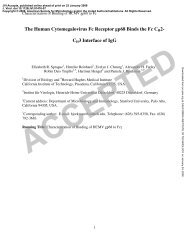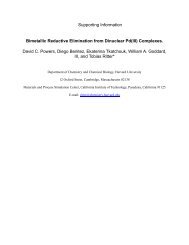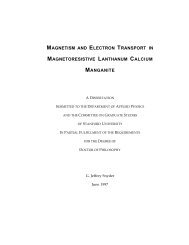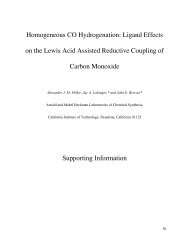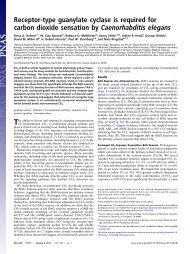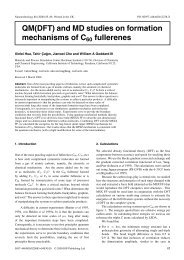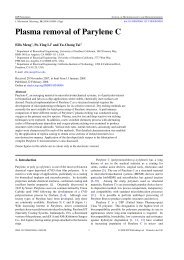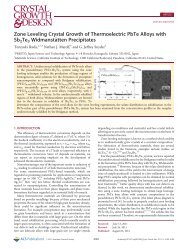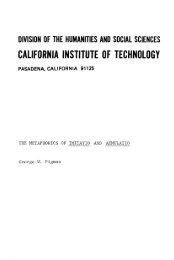Outrages
Outrages
Outrages
Create successful ePaper yourself
Turn your PDF publications into a flip-book with our unique Google optimized e-Paper software.
As recalled later by the Tory Lord Dartmouth, he asked "what their real apprehensions were from."<br />
Did they fear the Queen? The Duke of Leeds, angered by the question, answered tartly, "No, but if<br />
deer-stealers were got into his park, he should think his deer in danger though he had no suspicion<br />
of his keeper." Tom then asked, unwisely, if Leeds would name the rogues "that had got within<br />
the pale of the Church." Leeds replied with devastating bluntness: "If there were any that had<br />
pissed against a communion table or done his other occasions in a pulpit, he should not think the<br />
Church safe in such hands." After this answer, Dartmouth remembered, Tom "was very silent for<br />
the rest of the day, and desired no more explanations. "35<br />
Paradoxically, Tom might have suffered more for his sins if they had been less<br />
outrageous. The Barrington episode, even when recounted without embellishment, sounded like a<br />
Tory libel. It was hard to imagine anything so stupid proceeding from someone as bright and<br />
politically astute as Tom Wharton. Then too, the reputation of the brothers for outlandish<br />
escapades helped to make this event another prank to be pardoned rather than an unspeakable act of<br />
sacrilege-a prank more serious, to be sure, than breaking Madame Willis's gate ornaments, but<br />
certainly less bloody than running a sword through Nell Gwyn's horse.36<br />
For these reasons, and because many Whigs would have agreed that the Anglican stance on<br />
the succession and Dissent deserved an obscene comment, Tom's friends were inclined to ignore<br />
the scabrous episode altogether or dismiss it as an unfortunate "fit of drunkenness." Sir Ralph<br />
Verney, for example, found Tom readily forgivable. Explaining to his steward William Coleman<br />
why he supported Tom in the 1685 election for Knight of the Shire, Sir Ralph declared: "I am<br />
confident that he will serve the King and the country faithfully, though he is wild enough in drink<br />
and I am troubled at it, but who lives without great faults?"37<br />
And so it happened that an episode that would have driven most men out of public life and<br />
perhaps out of society altogether hardly dented Tom Wharton's political career. It earned him some<br />
satirical barbs (perhaps half as many as he deserved), but it seems never to have cost him an<br />
election. Nor did it affect his right as lay patron of several parish churches to present Anglican<br />
clergymen to church livings.<br />
About the time Tom was creating a public scandal, Anne, his wife, was engaged in a<br />
private intrigue with her brother-in-law Goodwin. As explained by Goodwin, the affair was a<br />
resumption of the romance that had begun before Anne went to France-with two important<br />
differences. One was a change in Anne's attitude. The once-narrow gulf between her and Tom had<br />
widened since her return. Because of what Goodwin calls "mutual jealousies"38 the couple had<br />
parted "as to her bed," and Anne now felt free to pursue her affair with Goodwin to its passionate<br />
conclusion. She "would be content to be damned," she once said, "rather than not have her<br />
desires. "39<br />
The second change was in Goodwin's principles, which had altered for the worse during<br />
Anne's absence. Perhaps influenced by a rascally alchemist named Broune, Goodwin had<br />
6


